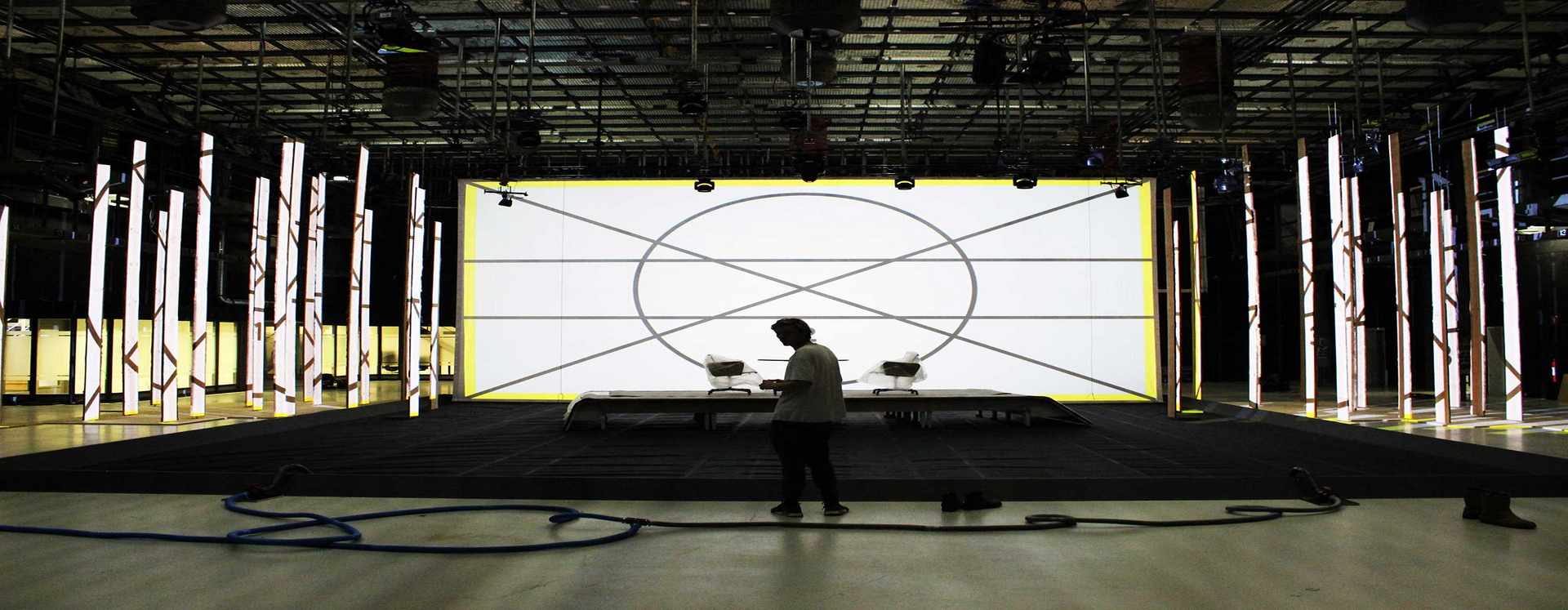Specialisation Technical Production
Imagine: a business is celebrating its 100-year anniversary and wants to organize an event for one thousand of its best customers in the Vondel Park in Amsterdam in 6 months-time. You’re asked to organize it. How do you make it happen? What do you need to consider? Catering. A covered area. Or heating/ air conditioning depending on the time of year. Personnel perhaps, but how many?
The director, scenographer, lighting- and sound designer will need to put their heads together: what do we want to create? What will the guests see or experience? What do we need to make this possible? The technical producer is in charge of carrying out all artistic plans: the size of the available space dictates how many days are needed to build up and dismantle all amenities. If this needs to happen very quickly, more personnel are required who are also entitled to a lunchbreak on site. How do you calculate the electrical power supply needed to serve a warm meal to all guests and personnel and ensure a successful event? Is it feasible to have trucks driving to and fro through the city centre? How do you organise the supply and disposal of water? How far in advance must the décor be ordered? When must the décor be on location? There are 1001 questions that you and your team need to tackle one by one. Communication within such a team is never one-way traffic, but always a constant stream of ideas and solutions. Everyone has their own interests which makes it harder to draw up a mutual plan without someone acting as coordinator. As technical producer you must take charge of this team. You are responsible for realizing the proposed ideas so that in 6 months-time 1000 people have a very enjoyable evening.
Head teacher: Michiel van der Zijde
Second year
You continue to work after examples from professional practice but have increasingly more eye for details. You learn to look from the perspective of a technical producer who together with a team, develops plans to realize a production. You develop the ability to see connections and think long-term. You gain know-how about touring with productions. If, for example, you only take into account small venues, your production will look very out of place in a large auditorium. You will make site visits to various theatres, suppliers and other parties involved. This will help you to discover where your interests lie.
At the end of the year, together with students of the study programmes Theatre directing 2 and Scenography 2, you will make a production based on a scientific phenomenon.
Towards the end of the second study year, you will choose an internship for the third year. Before doing so you must formulate your personal learning goals. During the second year you should also consider who you want to act as your external mentor. He/she will act as a contact for monitoring your development during the last two years of your study.
Projects during your second year
Décor, Construction and Implementation. In the décor studio of the National Opera & Ballet Company, you will work with third-year students of the Production and Stage Management study programme to construct a scale model together with technical drawings and also draw up a cost analysis/ budget.
You will collaborate with the singer-songwriter project along with students of the study programme Amsterdam Drama and Contemporary Music Theatre (ATKA) who will write a song as basis for a co-operative production.
At the end of the year, together with students of the study programmes Theatre Directing 2 and Scenography 2, you will make a production based on a scientific phenomenon.
Third year
Your research internship is central to the first semester of your third study year. You will undertake research in the work field with a theatre ensemble, at an event or festival or even with a business organization. On the basis of your personal learning goals, you will use this time to explore how a technical producer works. The third year is concluded with a graduation project in or outside the school or even abroad. While working on these different projects you will maintain contact with your external mentor. In the second semester, after completing the project ‘Mythological Melancholic Manifesto’, you are free to plan your own study trajectory. For example, by starting work on a graduation project, creating work of your own or following lessons at a university or other HBO study programme (internally or externally) or another internship. At the end of the year you must submit a personal graduation plan for your fourth year. A final interview with the head of studies will decide if your plan is approved.
Project during your third year
After your internship, you work together with students from Theatre directing 3 and Scenography 3 on the Mythological Melancholic Manifesto. Inspired by this theme, students work together on an equal basis to realise a production or installation in the large auditorium of the academy.
Fourth year
During the fourth year that comprises nine months, you will work on your graduation projects. A condition is that at least one graduation project must be realized during this time at school with students from other study programmes who are also completing their final year. A research project in the form of an essay or thesis (circa 6 weeks) is also a possibility as well as an internship.
